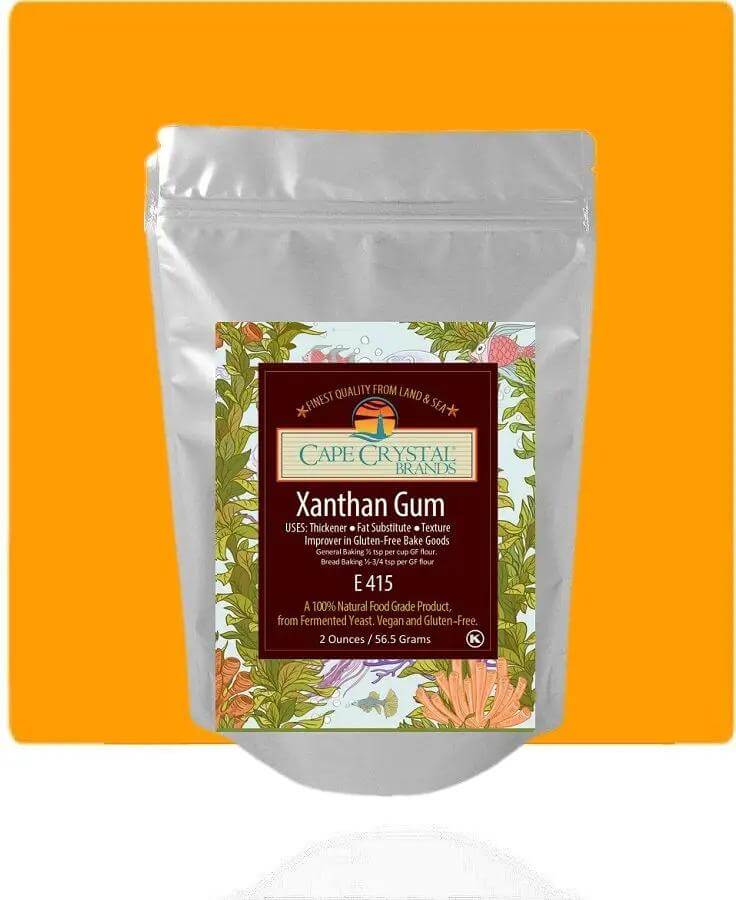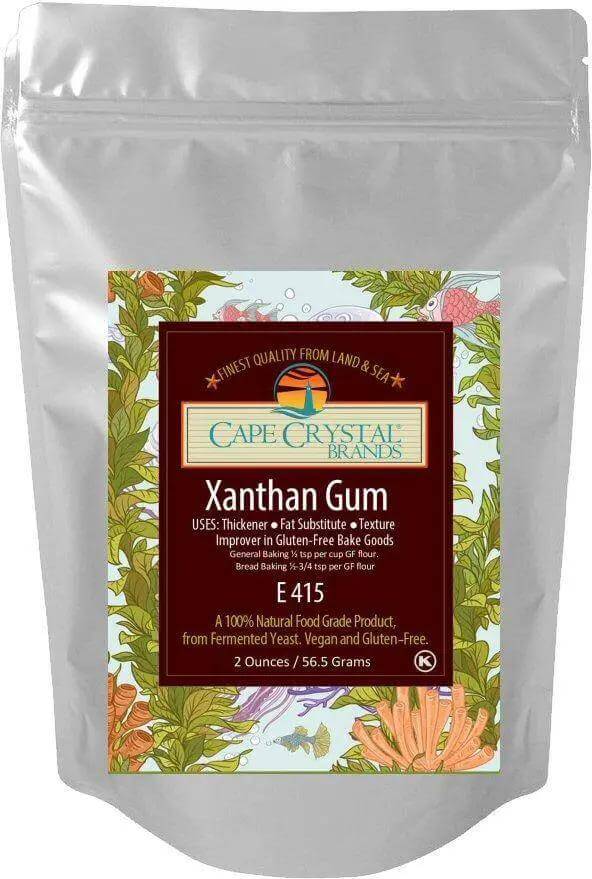Trending searches
Trending searches


















Cape Crystal Brands Xanthan Gum (Food Grade)
- Sale price
- $7.95
- Regular price
- $10.29
- You save
- $2.34 (23%)
Size: 2-oz
Frequently Bought Together
We Accept
PROPERTIES
Gluten-Free, Plant-Based, Kosher (K)
Pure Xantahn Gum Powder
None
Product Information
A versatile, powerful thickener and stabilizer — essential for gluten-free baking, sauces, beverages, and molecular gastronomy.
Key Benefits
-
Provides high viscosity at very low dosages
-
Improves elasticity and structure in gluten-free baking
-
Stabilizes emulsions and suspensions in beverages
-
Enhances mouthfeel in sauces, dressings, and ice creams
-
Heat- and pH-stable for wide applications
-
Plant-based, vegan, gluten-free, non-GMO, Kosher (K)
-
Available in 2-oz, 8-oz, and 16-oz packs
Properties
-
Dietary: Gluten-Free, Vegan, Non-GMO, Kosher (K)
-
Ingredient: 100% Pure Xanthan Gum (fermentation-derived)
-
Allergens: None
-
Documentation: COA | SDS | SPECs | Certificates
What It Does
Xanthan Gum is a natural polysaccharide produced through fermentation. It hydrates quickly and creates high viscosity at low concentrations. In foods, it acts as a thickener, stabilizer, and emulsifier, making it indispensable in gluten-free baking, sauces, dressings, beverages, and frozen desserts.
Popular Uses
-
Gluten-Free Baking: Adds elasticity and chewiness to breads, cakes, and cookies
-
Sauces & Dressings: Thickens and stabilizes emulsions, preventing separation
-
Beverages: Keeps particles suspended and maintains consistency
-
Ice Cream & Frozen Desserts: Prevents ice crystal growth and improves creaminess
-
Molecular Gastronomy: Used in foams, gels, and emulsions
How to Use
-
Dosage: 0.1%–0.5% by weight for beverages; up to 1% for thicker sauces or gluten-free doughs
-
Hydration: Disperse into liquid with high shear to avoid clumping
-
Compatibility: Works synergistically with guar gum and locust bean gum
Pro Tips
-
In gluten-free baking, pair with guar gum for improved elasticity.
-
Blend with sugar or dry ingredients before adding to liquid for easier dispersion.
-
Stable under freezing, heating, and a wide pH range.
Pair With
-
Guar Gum — enhances elasticity in gluten-free doughs
-
Locust Bean Gum — boosts viscosity and creaminess
-
Carrageenan — balances textures in dairy and frozen desserts
Storage & Shelf Life
-
Store sealed, cool, and dry.
-
Shelf life: 2 years.
Why Cape Crystal
-
Premium food-grade Xanthan Gum with consistent quality
-
Trusted by professional kitchens, bakeries, and home chefs
-
Backed by technical support and full documentation
Frequently Asked Questions
Q: What is Xanthan Gum used for?
A: It’s used as a thickener, stabilizer, and emulsifier in gluten-free baking, sauces, beverages, and frozen desserts.
Q: How much Xanthan Gum should I use?
A: Dosage is typically 0.1%–0.5% by weight for liquids, up to 1% for doughs and sauces.
Q: Is Xanthan Gum safe and natural?
A: Yes — it’s produced by fermentation, and Cape Crystal Xanthan Gum is food-grade, vegan, gluten-free, non-GMO, and Kosher.
Q: Can Xanthan Gum replace gluten in baking?
A: Yes — it provides structure and elasticity in gluten-free baking, helping breads and cakes hold together.
Q: Can Xanthan Gum be combined with other gums?
A: Yes — it works synergistically with guar gum, locust bean gum, and carrageenan.
Customer Reviews
⭐️⭐️⭐️⭐️⭐️ “Game-changer for my gluten-free baking — my bread finally has structure.”
⭐️⭐️⭐️⭐️⭐️ “Great quality, dissolved perfectly into my dressings without clumps.”
Call to Action
Thicken, stabilize, and elevate your recipes with Cape Crystal Brands Xanthan Gum. Available in 2-oz, 8-oz, and 16-oz packs.
For Further Information for Xanthan Gum:
Xanthan Gum in Recipes: Ultimate Guide
The Ultimate Guide for Using Xanthan Gum in Your Recipes
Xanthan Gum: Elevating Consistency and Mouthfeel in Culinary Delicacy
Recommended for You
Browsing history
- Choosing a selection results in a full page refresh.
POLICY PAGES
QUICK LINKS
Guar Gum
Cape Crystal Brands, 18 Bank St., Suite 1, Summit NJ 07901.
- Phone: +1 908-273-5600
- Email: info@capecrystalbrands.com
- Tax ID: 26-2477626000
- FDA Facility Registration # 16980627550
- Kosher Certified: OKosher.org
Country/region
© 2026, Cape Crystal Brands | Sitemap
